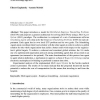Free Online Productivity Tools
i2Speak
i2Symbol
i2OCR
iTex2Img
iWeb2Print
iWeb2Shot
i2Type
iPdf2Split
iPdf2Merge
i2Bopomofo
i2Arabic
i2Style
i2Image
i2PDF
iLatex2Rtf
Sci2ools
124
click to vote
ANOR
2007
2007
Distributed personnel scheduling - negotiation among scheduling agents
This paper introduces a model for Distributed Employee Timetabling Problems (DisETPs) and proposes a general architecture for solving DisETPs by using a Multi Agent System (MAS) paradigm. The architecture is composed of a set of autonomous software Scheduling Agents (SAs) that solve the Employee Timetabling Problems (ETP) for each department. Each agent has its own local ETP problem and its own goals. The Scheduling Agents must coordinate their local solution with the other agents in order to achieve a global solution for the whole organization that yields a better result with respect to the organization’s global targets. To achieve a coherent and consistent global solution, the SAs make use of a sophisticated negotiation protocol among scheduling agents that always ends in an agreement (not ensured to be optimal). The main functionalities of this protocol are agent to agent relation definition, a mechanism to approve a chain of Request for Changes and an electronic marketplace for ...
Related Content
| Added | 08 Dec 2010 |
| Updated | 08 Dec 2010 |
| Type | Journal |
| Year | 2007 |
| Where | ANOR |
| Authors | Eliezer Kaplansky, Amnon Meisels |
Comments (0)

